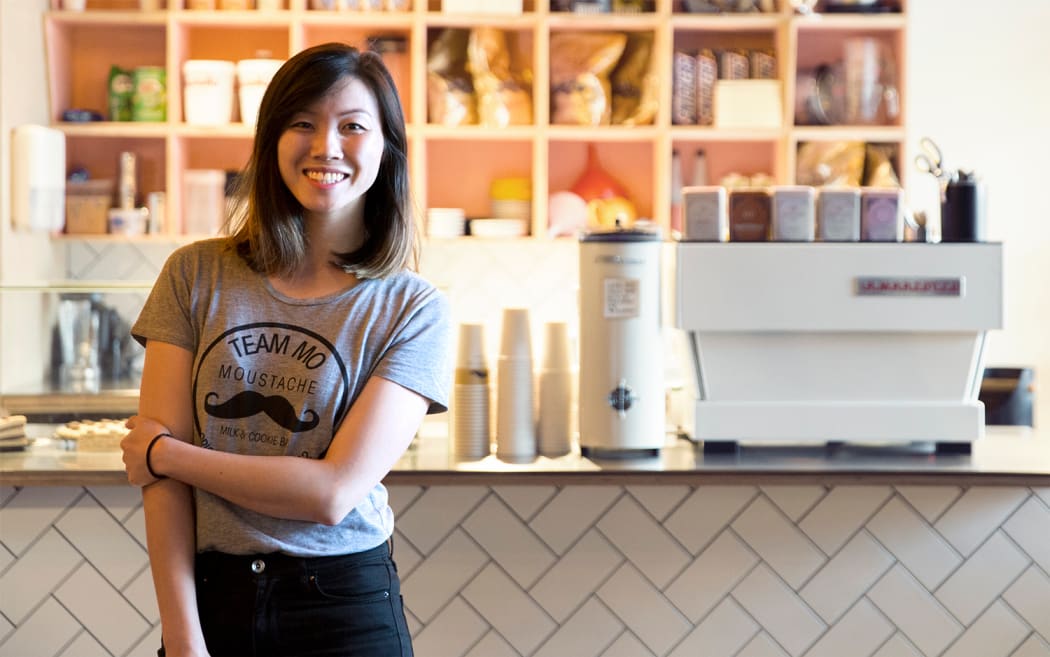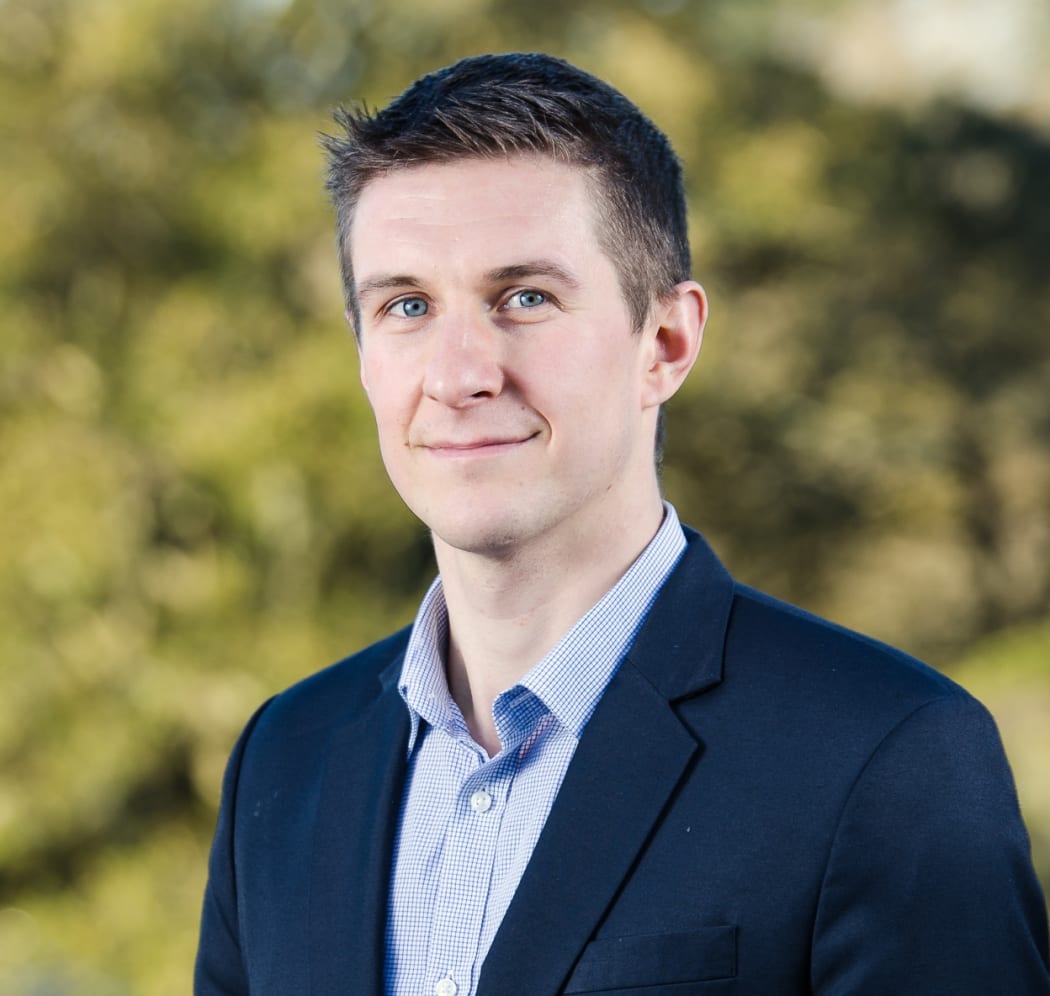Taking an axe to tall poppy syndrome.

Deanna Yang was told she should be selling pies, not cookies, when she was starting up her business. Photo: Luke McPake/The Wireless
When Deanna Yang was eight years old, she dreamed of opening a cookie shop.
Now at 26, she’s the “Chief Cookie Officer” of her own company, Moustache Milk & Cookie Bar, and she has stores on Auckland’s Karangahape Rd and at the University of Auckland, as well as a milk and cookie bus.
The sweet road to success carried many challenges. Deanna says as a 21-year-old journalism major looking for a shop space to start her business in, she was often made to feel like “a silly, naive little girl” by the very people she sought help from.
“I would go to the bank or have to go to real estate agents and nobody wanted to give me the time of day because they would take one look at me and think I’m not really worth their time,” she says.
They told her she had to sell sandwiches and pies, that milk and cookies weren’t going to work. One real estate agent told her the landlord of a property she wanted to lease didn’t allow the sale of food. Deanna ended up opening her first shop there in 2012.
When she ran a crowdfunding campaign in 2015 to turn an old Bedford school bus into a moving milk and cookie station (because she had to close her original shop due to inflated rent), older businessmen told her that she was stupid and there was no way she would be able to raise the $80,000 she was asking for.
The crowdfund closed at $91,000.
Deanna says there are still members of the public and acquaintances who refuse to recognise the 80 to 100 hour weeks and sleep-deprived nights that have gone into building a cookie empire on a limited budget; instead, saying she’s “lucky” to have made it so far.

The first Moustache Milk & Cookie Bar shop opened in 2012. Photo: Luke McPake/The Wireless
“It’s like, well if something goes wrong, it’ll be because you’re silly and naive. But if it goes right for you, then you’re lucky,” Deanna says.
“It feels like you can’t win.”
RISE ABOVE
Some of the challenges Deanna describes are typical cases of tall poppy syndrome, where people who stick their heads above the crowd are attacked and diminished. Those who work with entrepreneurs say it’s time for a culture change if we’re to see the next generation of young business people thrive.
Otago Polytechnic’s Jodyanne Kirkwood has researched the effect of tall poppy syndrome on Kiwi entrepreneurs and found most entrepreneurs she spoke with had experienced it in some form, although the actual impact of it on business outcomes was generally minimal.
“What we love about New Zealand is partly the very things that cause tall poppy syndrome. We’re very egalitarian, respectful, we treat everyone the same. If someone goes above that, we go, ‘You’re not like us anymore’,” she says.
Compare that with somewhere like the United States, where successful people are celebrated and failure is accepted. The US consistently ranks as one of the best countries in the world for entrepreneurs. New Zealand, according to an index compiled by leading US business school Wharton, is ranked 19th out of 80 countries, behind the likes of Germany, Japan, Australia, the US and the UK. The index measures 10 attributes related to how entrepreneurial a country is, including how educated the population is, how innovative and entrepreneurial they are, access to capital and technological expertise. While New Zealand scores well on transparent business practices and having an educated workforce, the country falls behind in technological expertise and innovation.
We’re very egalitarian, respectful, we treat everyone the same. If someone goes above that, we go, ‘You’re not like us anymore’.
Jodyanne says the culture of cutting others down has led to a reluctance from entrepreneurs to share their stories. When she asked business people if they could be case studies for her research, most declined because they didn’t want to draw attention to themselves.
“We’re not good at blowing our own trumpets,” she says.
It’s that trumpet-blowing that Kiwi Landing Pad community director Sian Simpson says Kiwis need to get better at. Based in San Francisco, she works with hundreds of Kiwi startups each year to help them grow. She says without a culture that encourages people to share their experiences, young entrepreneurs don’t have the role models they need.
“We need more people who are willing to be a tall poppy. Be a tall poppy and be proud of that.”
‘JUST A COUPLE OF YOUNG KIDS’
Two years ago, Aucklander Ben Reynolds started getting together with some mates to do alternative sports commentary for fun and because they were sick of the usual commentators. People liked what they were doing so they developed some software and in 2016, Spalk officially launched.
The company works with broadcasting networks to provide alternative commentary for sports games. They’ve just raised $500,000 in investment and are looking to expand to Australia, the United Kingdom and North America.
Ben, 23, says many of the business challenges he’s faced have been age-related. That sometimes has meant a lack of respect when meeting with broadcasters, who “look at us and say, they’re just a couple of young kids who don’t know what they’re doing”.
Recently he met some friends of friends for the first time and when he told them he was an entrepreneur, they joked about how that was “a code word for being unemployed”.
“If you don’t work for the Big Four accounting firms or an investment bank or whatever, people will view you as not as good as them. It’s very elitist and status-driven, which is fine. It fuels the hunger, if anything,” Ben says.
The former University of Auckland business student believes having the right inner circle of family and friends can make or break an entrepreneur. Similarly, having access to the right mentors is critical, he says.
“Success in entrepreneurship is all about standing on the shoulders of all the people who have gone before you.
“The better the support networks and the more that entrepreneurship is celebrated, the more likely future generations are going to choose entrepreneurship.”
IGNORING THE CRITICS
Canadian-born Hayden Hughes recently graduated from the University of Auckland’s law school, but he won’t be practising law. Instead, he’s focusing on his business, Momentum Tutoring, which he started in 2013 after experiencing a lack of tutoring and mentoring support during his first year of university.
Because he charges for the tutoring (on average between $7 and $12 an hour, he says), he and his staff are regularly accused of exploiting first-year students for a profit. He’s had personal attacks on Facebook, with a recent one being from someone who commented about how Hayden loves being “handsomely rewarded” by fellow law students.

Hayden Hughes' mentoring business has taken flak from within the UoA law school Photo: Supplied
He’s had one of the law school’s tutors openly criticise his business during class. He says another law school in the country refuses to work with him, despite students there showing a strong interest in receiving tutoring. The deputy dean told him in an email that they were “more than satisfied” with services already provided by the university and so would not support Momentum Tutoring operating at the faculty.
“At the end of the day, a part of running a business is having to deal with folks who don’t love what you do,” Hayden says.
The 31-year-old is no stranger to enterprise, having founded a window-cleaning business as a student in Canada, which he later franchised and then sold. He says there is definitely a part of Kiwi culture where people don’t like to “wave the flag” about their achievements.
“I think to succeed as an entrepreneur anywhere you have to find a solution to a problem that you think you can take a crack at and say: I don’t care what people think. I can do this better.”
TEACHING THE RIGHT SKILLS
Ministry of Business, Innovation and Employment data shows that of the small businesses that started in 2010, 41 per cent of those with between 10 and 19 staff had ceased operations by 2015. Of those run solely by the founder, almost 60 per cent had ended within five years.
There are many reasons why businesses die and according to leaders in the startup scene, New Zealand’s schools could do more to help small businesses succeed.
All the skills that come with being an entrepreneur - not being afraid of taking risks, problem-solving, innovating, having the confidence to be bold - are useful tools right across life.
Oliviah Theyers-Collins is the programme director of youth business accelerator programme Venture Up and she says young people are taught at school that it’s either “uni or bust” and entrepreneurship isn’t a real career option. A lack of knowledge about what is required to go into business could be a key reason why entrepreneurs face some of the backlash that they do from non-entrepreneurs and also why some entrepreneurs fail.
“All the skills that come with being an entrepreneur - not being afraid of taking risks, problem-solving, innovating, having the confidence to be bold - are useful tools right across life,” she says.
Andrew Hamilton, chief executive of business growth hub The Icehouse, says there’s actually a lot of support available for young entrepreneurs in New Zealand, as well as some great business development programmes. It’s more self-doubt and challenges in the market that lead young entrepreneurs to struggle or fail.
However, he says improvements to the education system wouldn’t hurt. There could be more of a focus in the curriculum on basic business skills and concepts, like what market validation means, how to write a one-page business plan and what the lean startup method of developing businesses and products is, he says.
“We could do a way better job at giving our secondary school children some fundamental skills that can help turn their ideas into something that could be a business.
“How we prepare our children for the world needs to change.”
NO FAST-TRACK
When Deanna was eight years old, she was obsessed with Harry Potter and wanted to go to London to be a witch. Her priorities have changed since then, but she still wants to go to London - and other parts of the world - to expand her business.
She knows the hard work and sacrifice required to do that and that’s something she believes other young people need to understand before choosing the entrepreneur’s life.
“You just have to be prepared to hustle from the get-go, accepting that it might be a torturous climb up that hill. It’s not a nine to five. I eat thinking about work, I sleep thinking about work, I wake up thinking about work. It really overtakes your entire life.
“It’s more about your hard work and persistence and hustle more than anything.”

